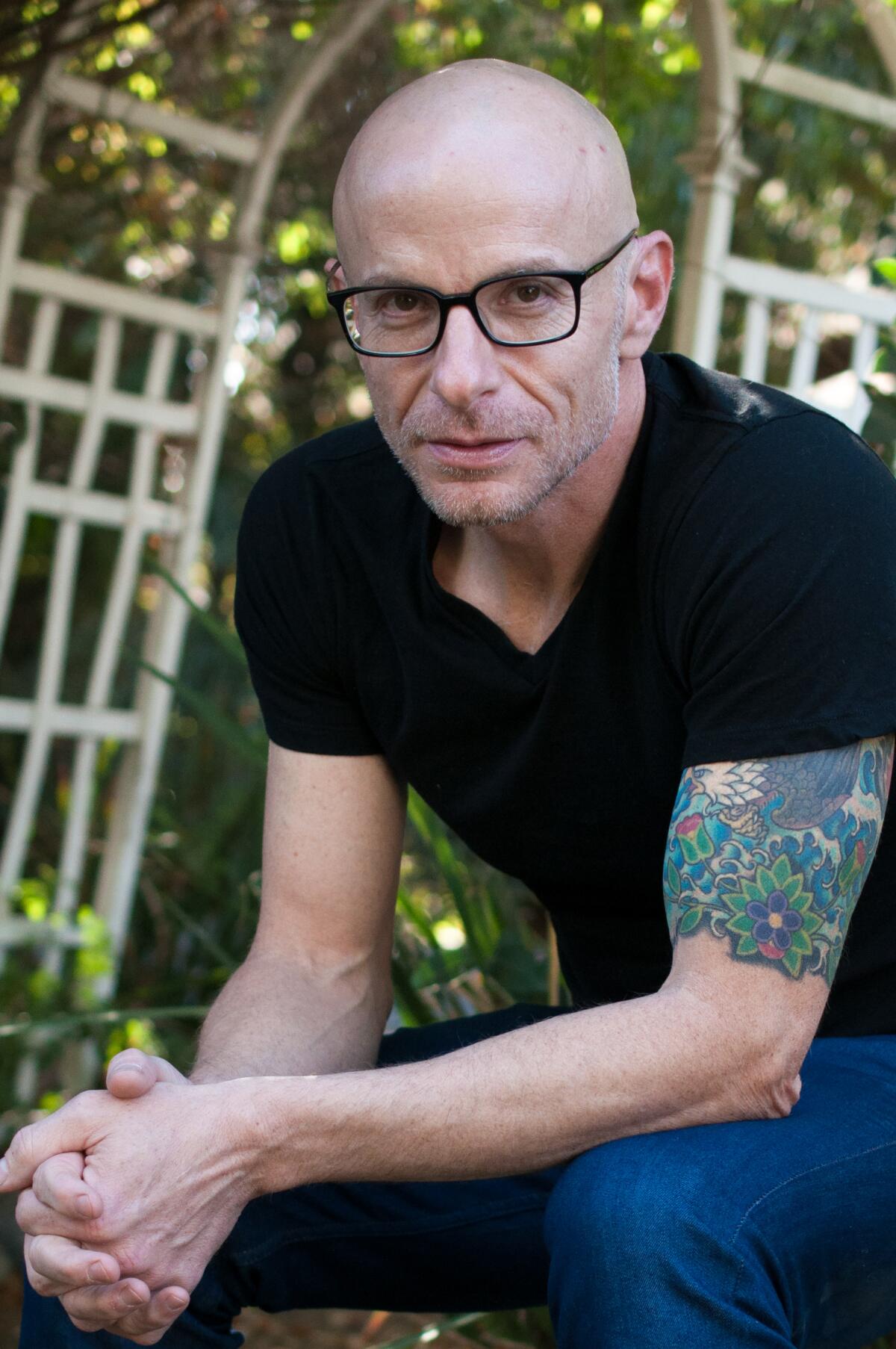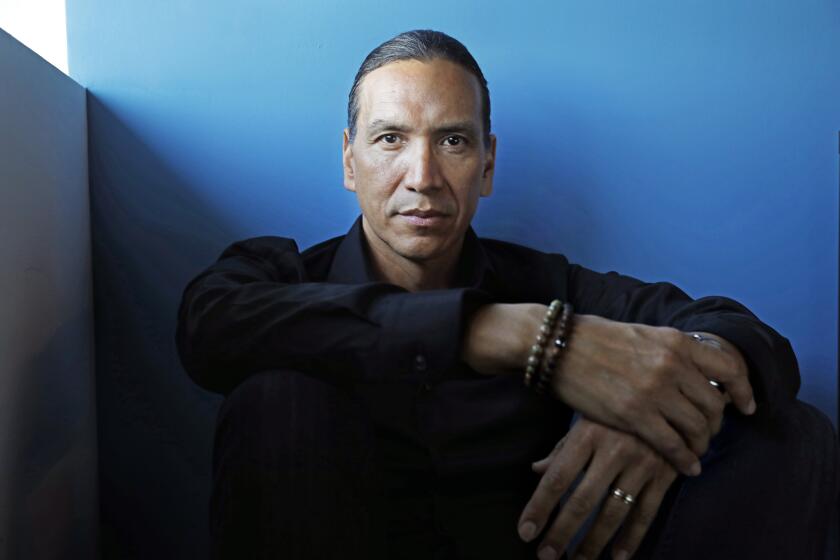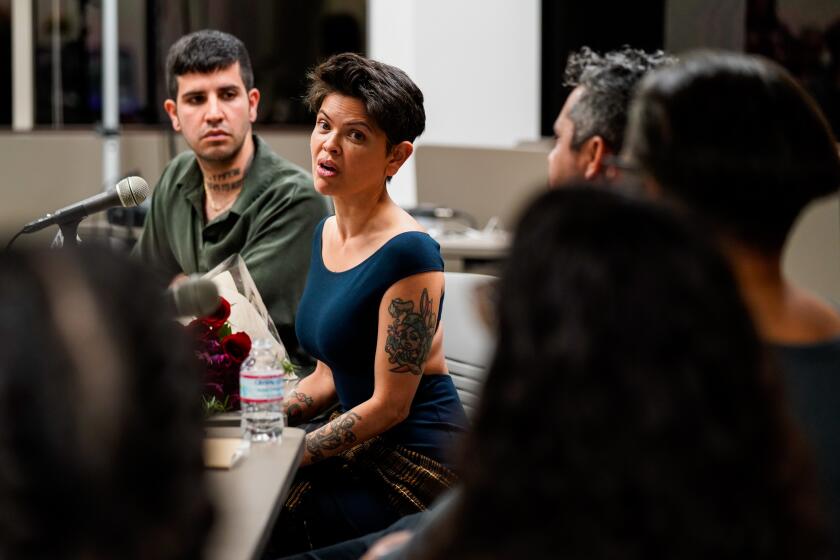Author David Treuer mentored a generation of Native authors. Now, he’ll publish them

- Share via
David Treuer believes he might be one of a few professionals doing what a friend called “The Toni Morrison trifecta”: teaching, writing and editing.
It’s an apt comparison. As an editor at Random House for many years before going on to win the Nobel Prize in literature, Morrison brought the world writing from Angela Davis, Toni Cade Bambara, Gayl Jones and Henry Dumas, opening books and publishing to unapologetic Black authors and expanding American culture even before she wrote masterpieces like “Beloved.” (She later taught writers, including Treuer, at Princeton.)
Treuer, in his new gig, has positioned himself to do something equivalent for Indigenous writers. Last month, Pantheon Books, an imprint of Knopf Doubleday Publishing Group, announced that Treuer would become an editor at large, acquiring and editing fiction and nonfiction with a focus on Native writers and emerging voices.
“It’s such a privilege to have this opportunity to help literature generally and Native writers and Native books in particular,” said Treuer.
The author is especially suited for the job. An Ojibwe from the Leech Lake Reservation in Minnesota, he has published four novels and three nonfiction works. “The Heartbeat of Wounded Knee,” a New York Times bestseller and a National Book Award finalist published in 2019, was an eye-opening counternarrative of Native American history beginning with the Wounded Knee Massacre of 1890 — in which some 300 Lakota in South Dakota’s Pine Ridge Reservation were killed by U.S. Army troops — to today.
“It’s a pleasure to watch this team come together and David will be an essential contributor to the evolving list that will shape Pantheon’s future,” said Lisa Lucas, publisher of Pantheon and Schocken Books, in a release.
Treuer spoke with The Times about his new role and how it dovetails with his other work. The conversation has been edited for length and clarity.
What were you doing before you got this job offer, and how did your work lead there?
I’ve been a professor since 2000, first at the University of Minnesota and, for the past decade, at USC. I teach literature and creative writing, and I’ve been lucky to work with and hopefully mentor a couple of generations of student writers. That seemed like the perfect segue into editing and publishing. If I’m known for anything at all, it’s probably for being a fiction and nonfiction writer.
How I ended up at Pantheon was that I got asked to write a book review for the New York Times on a book that came out two summers ago by a Native author. [Treuer declined to name the book.] I remember thinking that the book had so much promise, but there were so many mistakes. I don’t mean grammatical mistakes or wording or style problems, but conceptually it was a very complicated book. He made so many weird and gross assumptions and used his Native material in ways that were not just inopportune but destructive.
Michael Greyeyes (‘Rutherford Falls’) and Devery Jacobs (‘Reservation Dogs’) look back on a milestone year for Indigenous representation on screen.
I remember telling friends that summer: “This book could’ve been saved. Are there any Native publishers working in publishing? Are there any editors at all?” I did a loose survey online and on social media; I read surveys that look at the publishing industry as a whole. And from what I could tell, there is not a single Native person working at a trade imprint in the United States, at any publisher of any size.
There are Native editors at university presses I’m sure, but the books you’re going to see at the airport and Barnes & Noble, at Powell’s and Elliott Bay, none of them will be edited by a Native editor, and that seems to me like a huge problem of representation in publishing.
There have been some pretty high-profile articles about Lisa Lucas, my new compatriot and boss, who got the job at Pantheon talking about the underrepresentation of African Americans in publishing. But it’s so much worse for Native people because it’s not like we’re underrepresented, we’re not represented. Period. There are hundreds if not thousands of books every year about Native people and increasingly by Native people, and none of them have found a home with an editor who is Native. After realizing that I thought, “Well, why don’t I do that in addition to my writing and teaching?” And here we are.
So you reached out to Lisa and said, “Do you want to hire me to focus on Indigenous writers?”
We talked to a number of different people and Lisa was one of them. I’d known Lisa from the National Book Foundation and also back when she was an editor at Guernica. It seemed like a great fit for what Pantheon was trying to do and a great opportunity to work together because Pantheon is shaping up to be a really exciting place for vibrant new [work] by a whole new generation of writers.
Two Black women are taking top positions at Simon & Schuster and Knopf. They talk to Rebecca Carroll about language, action, the power of books and the pace of change.
Will you be doing it full time? What will it look like for you?
I’m doing it on top of my other full-time jobs. I’m contracted to acquire at least two per year. It’s very focused and thus very manageable.
I feel great about being in the unique position of working as a writer over many decades, and working as a teacher for almost as many years, to bring all of that experience to bear on other people’s work in a professional capacity, because I’ve certainly done that as a professor. But it’s really exhilarating to lend my experience to new voices; there’s so much talent out there. There are so many Native people and others writing such interesting, important books, and to have an editor who knows the field of American fiction and Native American literature going all the way back to the 18th century, I feel uniquely privileged to situate this new work in a wider field of literature in English.
There have been several movements in recent years to make publishing more inclusive. There was #DignidadLiteraria in response to the “American Dirt” controversy; #PublishingPaidMe to highlight pay inequity; #OwnVoices advocating for stories about marginalized communities written by people who share those experiences. What changes have you seen in publishing to make it more inclusive and diverse, and what still needs to be change?
The fact that Lisa Lucas takes her role at Pantheon is indicative of structural changes. It started in the ‘80s with rise of the multicultural movement — this sentiment that paying attention to and elevating the works of writers of color was a liberal act that we should do as a social good. That’s not wrong. But the fact is, the opportunity and the need to amplify these voices goes beyond a liberal corrective. Honestly, the most interesting, vital, exciting, freshest, most inventive, important and timely work is being produced by — not exclusively of course — but by people of color.
So that’s the better reason to pay attention to, amplify and nurture not just Native writers but all sorts of emerging writers from different communities.
Inside a packed room in Culver City on Thursday, Myriam Gurba, Roxane Gay and other writers of color talked about “American Dirt,” Macmillan and the “crisis” in U.S. publishing.
Are you working on anything you’re excited about?
I don’t even have an email address yet! [Laughs]. There’s no one I’m editing right now. We’re really gonna hit the ground in January.
More to Read
Sign up for our Book Club newsletter
Get the latest news, events and more from the Los Angeles Times Book Club, and help us get L.A. reading and talking.
You may occasionally receive promotional content from the Los Angeles Times.












